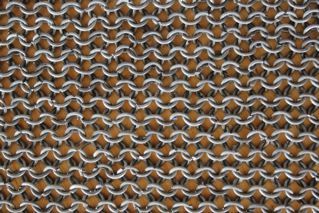My sixteen-year-old son is sitting at the dining room table, using needle-nose pliers to link tiny rings of seventeen-gauge steel wire. He is making chain mail. The tail end of a fresh scar peeks out from under his right ear. “It’s a beautiful day,” he says with longing as I enter the room. I agree. But it is not the summer we imagined it would be.
Back in April, when Jordan was discussing his summer plans, he was thinking about expanding his blacksmith shop; building a logging road through our woods; clearing brambles from miles of hedgerows, and training his steers to pull a plow. Every option was exciting.
Then in May came the news. The loss of hearing in Jordan’s right ear that we thought was surely due to impacted wax was not. Its cause was a tumor—a large one, too big to radiate—that was growing from the lining of his acoustic nerve into his brain. Surgery was the only option. As soon as possible. We set a date: July 6. So much for summer.
The news was crushing. But as it settled, my partner, Geoffrey, and I made a decision. It seemed so easy to fall into tear-streaming, pulse-stopping fear. We refused. We didn’t want someone else to determine the meaning of this event in Jordan’s life or in ours. It wasn’t a tragedy. It wasn’t heartbreaking. It wasn’t going to ruin our family's summer.
We dared to ask new questions. What opportunities would this tumor open up? What could we do to make this summer a good one—even the best one? How could we transform brain surgery into a blessing? To do so seemed a miracle.
The first step was obvious: we had to believe we could. We had to imagine it. We had to align our thoughts and feelings and actions with what it would take to make that miracle happen. It might not happen, but if we didn’t want it, it surely wouldn’t. We had to walk the knife-edge of faith, not looking down to the left or the right, only forward to the best possible future.
From that moment on, whatever else I was doing, I had one tentacle of attention touching July 6. Every day I walked myself through the drive to the hospital, the operation, Jordan’s waking up, and his recovery, seeing us all through to Jordan’s most whole health.
Meanwhile, Jordan came up with an idea for a project he could do while recovering. He would make a chain mail shirt. He experimented, and began a length of links. He cut thousands of three-eighth's inch circles from old fence wire, and piled them into a small paper bag for later use.
On July 6, at 5 AM, Jordan and I left Geoffrey and Jordan’s four younger siblings on the farm, and set out for the hospital. By 8 AM, a team of nine, including three surgeons, had taken control of Jordan’s bodily systems, and driven him to the edge of life. They held him there for eight hours, while they cut a two-inch circle of bone from his skill, extracted a tumor over three centimeters in diameter, and patched him up again. They left a five-inch crescent cupping his right ear. The neurosurgeon found me in the waiting room and greeted me with words I had been imagining for weeks: “It went as well as could be expected.”
For three days, Geoff and I took turns at the hospital as Jordan struggled to free himself from the monitors and fluid pathways that had sustained him during the surgery. He was in pain and nauseous. Food would not sit; neither could he. His vision was double; his taste was halved, and the right side of his face was weak. The doctors weren’t worried.
On the third day after surgery, Jordan’s sisters visited, and he remembered: home—on the farm—was where he most wanted to be. On the fourth day after surgery, the neurosurgeon released him to go. Jordan had held down nothing but a few cheerios. We weren’t sure he was ready. He knew he was.
He climbed into the front seat of the car, cranked it all the way back, and hummed low resonant tones for the hour and a half drive home. “It’s the only thing that keeps me from getting carsick,” he said.
Home on the farm Jordan felt better immediately. The nausea left for good. He stopped taking pain medication. He spent the first few days lying down. He slept. He read. His sister read to him. We all gathered round and listened.
On the third day home, after pouring over one of his metal working books, Jordan sighed, full of desire to make something. “I want…” he said and then stopped. He continued. “But I am glad that I want. I know what it is like to feel so badly that you don’t want anything.” Want no longer felt like lack. It felt like life returning.
On the fourth day home, Jordan sat up, ready to make his chain mail. “I’m not sure what this is about,” he said to me as he formed his links. “Stubbornness? Perseverance? What do you think?”

I paused. “Well, chain mail is designed to protect you from sharp things that cut. So perhaps you are protecting yourself too—not from a sword but from the disappointment and frustration of not being able to do what you thought you would this summer. You are making something that you can and like to make. You are protecting yourself from the cut of despair.” He was, I knew, protecting us as well.
We used a T-shirt of his to trace a pattern. He began working his way up the front of the shirt, from ribs to shoulder. As I watch him now, just over two weeks post-surgery, he is beginning the back.
Link by link, Jordan is healing. He can sit and stand and walk for longer periods of time. While fluid in his head seems to slosh when he moves, he is getting used to it. His eyes are focusing, his smile pulling higher, and his taste returning. The shirt is growing. The miracle we most wanted is happening. Link by link, Jordan is making himself whole.
Even before the surgery, the tumor had knocked out the hearing in Jordan’s right ear. It is not likely to return. Even so, I can’t help but think that this too harbors a potential for wonder. Because he has been losing hearing in that right ear, Jordan has been cultivating his hearing. He actively reaches into the world to gather its sounds. He attunes himself to what is. He pays attention. Unless his left ear is plastered with a pillow, he does not miss a beat.
Yet through this experience, it seems that Jordan is hearing far more as well. Jordan can hear the silence—the silence of himself, the silence within. He can hear the life pulsing in his want; the rhythm rumbling in his belly, and the hope beating in his actions. He knows the faith that keeps creating; and the creating that keeps the faith.
Because of Jordan, we, his family, know it too. Following his lead, we are linking our lives together and resisting the cut of despair. We are imagining and bringing into being a world in which we want to live—a world where miracles happen. We are listening for the silence—the freedom, the possibility, the love—at the heart of it all.
This summer is not what we thought it would be. It has been a miracle in the making.




